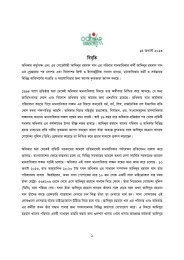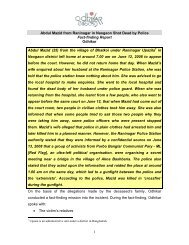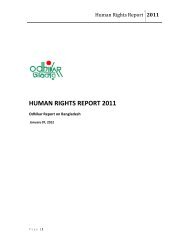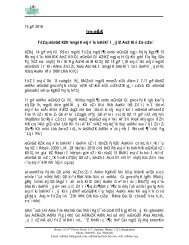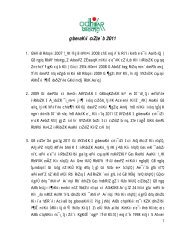Please - Odhikar
Please - Odhikar
Please - Odhikar
Create successful ePaper yourself
Turn your PDF publications into a flip-book with our unique Google optimized e-Paper software.
(b) In addition, the proceeds, properties and assets derived directly or indirectly from the<br />
commission of genocide, crimes against humanity, or conspiracy or abetment to these crimes be<br />
forfeited.<br />
The enactment of such a radical piece of legislation will not by itself remedy the gaping flaws<br />
that have emerged in India's criminal justice system. But its enactment if accompanied by radical<br />
police reform will radically shake the immunity of class, caste and privilege that have guided our<br />
system and re-open the debate for an independent, confident, upright police force more than ever<br />
before.<br />
It is about time that we take this bold step forward.<br />
Multiple Legalities and the Debt of Morality<br />
for the Pakistani Subject<br />
By Dr. Saeed ur Rahman*, Pakistan<br />
Pakistan inherited the legal structures of the British Empire in 1947 and, therefore, had a<br />
legal regime that followed the structures of the Common Law system. Alongside this<br />
system existed other systems of justice dissemination such as the jirga System of the<br />
Federally Administered Tribal Area. The local traditions of distributing justice were also<br />
practised, but without an explicit approval from the state: for example, the system of panchait in<br />
the villages of Punjab and the Vadera acting as the judge in Sindh. These different legal systems<br />
co-existed within Pakistan at the time of its inception and continue tody in different forms.<br />
The British Common Law continues to operate subject to various amendments by different<br />
governments. The amendments introduced by Zia ul Haq, the martial law administor, are<br />
discussed below because of their role in severely affecting the status of human rights in Pakistan.<br />
The tribal system of justice operates in areas collectively labelled the 'Federally Administered<br />
Tribal Areas'. The State of Pakistan has no legal jurisdiction over these areas, except in the form<br />
of the Office of the Political Agent. The Political Agent is a representative of the Federal<br />
Government and mediates between the Tribal Areas and the Government. The tribes are<br />
constitutionally and jurisprudentially free to conduct their own legal and social practices except<br />
when they have to interact with the Political Agent. The Political Agent administers government<br />
subsidies to the tribes and the arrival and departure of people to and from the tribal area. The<br />
rights of a victim and/or a witness under the tribal legal system are controlled by the jirga<br />
(assembly) system. The Chief of a Tribe heads a jirga and the Political Agent is the adjudicating<br />
authority. The jirga comprises of prominent people and elders of the tribe who pass judgement<br />
on civil and criminal proceedings. The rights, suitability to testify, and the safety of a victim or<br />
188<br />
Report 2005




